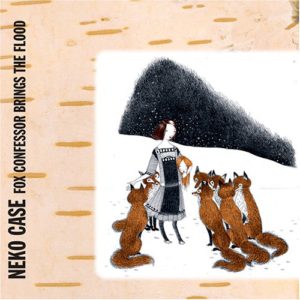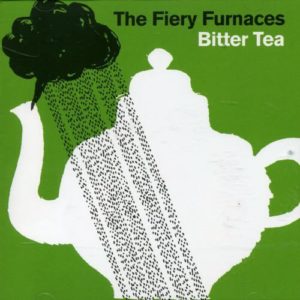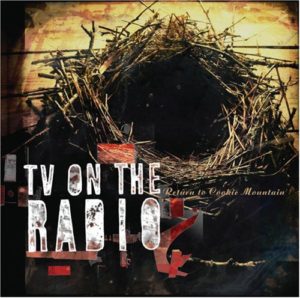
Neko Case: The Siren of 2006
Was 2006 the single best year of the previous decade, music-wise? Who knows. Who cares. It was pretty fantastic and, as hopeless but happy music fanatics will always attest, the same can be said about every year, every decade.
Still, 2006 was one for the ages. And ten years later, it’s worth looking back at three albums that have aged extraordinarily well. Each was, to varying degrees, both critically and commercially embraced, although there was no consensus or near-consensus—as there tends to be most years—regarding which one(s) were the best. Nevertheless, they are three very different albums, stylistically and aesthetically, and they’re each perfect in their own weird, wonderful ways. More, with the benefit of a decade’s hindsight, they not only represent watershed moments in each band’s career, in the humble opinion of this writer, no subsequent work has come especially close to equaling these achievements. And if that sounds like either condemnation or complaint, let it be stated that not much work by any other artists has come particularly close, either.

Neko Case, Fox Confessor Brings the Flood (March, 2006)
Let’s talk a little bit about perfection.
What is it, and who gets to define it? And more importantly, who cares? What, for that matter, elevates something to the status of “best”? These sorts of discussions are subjective, and enough similarly inclined personal perspectives shape consensus over time. These are the types of semantic shenanigans writers and critics engage in and lose sleep over, which would be almost pathetic if for the simple matter that it’s all about genuine love of art and the aspiration to elevate it; to share that passion and, whenever possible, help edge consensus toward a worthwhile candidate.
Fortunately, I’m very far from alone in wanting to celebrate the almost inhuman brilliance of Neko Case. Everyone loves Neko and seemingly everybody appreciated Fox Confessor Brings the Flood. And yet, I’m not satisfied. Fox Confessor Brings the Flood was not merely one of the better albums of 2006; it was the best album of the decade. More than that, it’s an absolute and utter masterpiece, practically perfect in every way, and will be studied and savored as long as people are still listening to music.
If you are surprised by, or not really feeling, this appraisal, I may be incapable of convincing you. I am, however, quite content to offer some of the reasons I find this to be the most profound and enduring work of the previous decade. On this release, every possible element is aligned: the cover art perfectly reflects the subject matter of the songs, the lyrics of those songs are uncommonly (bordering on unbelievably) intelligent; this is real literature and works as poetry. But in truth, they are devastatingly effective short stories that stick with you long after first listen. And the songs themselves: each song, all sequenced in ideal order for maximum import.
Leave it to Neko Case to find inspiration in Russian folk tales to craft a series of songs that are thoroughly American and of the moment. But, like so much great art (including, obviously, books and movies), intentional or not, if the artist is sufficiently perceptive and historically cognizant, the resulting work cannot help but recall themes and images of the past. In this regard, Fox Confessor Brings the Flood is as much a Russian novel as a Y2K progressive country-rock folk album. “Dirty Knife”, on any other album, would be a highlight to treasure and celebrate; on this album it’s merely another condensed tour de force. Check it out: if any song on any album could be said to contain Whitmanesque multitudes, it’s the title track.
Speaking of that “p-word” again, I don’t expect I’ll find two better examples of perfection in music than “That Teenage Feeling” (talk about a novel in two minutes) and “Hold On, Hold On” (when Neko proclaims “I leave the party at 3AM, alone thank God/With a valium from the bride, it’s the devil I love”, she’s at once penning some of those most mordant lyrics of the decade and expressing a delightful recalcitrance that makes her the radiant object of so much unrequited lust). Perhaps her most ambitious song (to this point and since) is “Star Witness”. It’s enlightening to read Case discussing what inspired this real life soap opera, snatched from the headlines and designed to cleave a hallway through your heart.
The album winds down with some truly beautiful meditations on life, love and mortality (and the ever-present concept of lost faith): “Maybe Sparrow” and “At Last” which are arresting in their unadorned expression: they are cris de coeur but without self-pity. And, as always and as ever, Neko’s voice is a glorious force of nature, effulgent in its vulnerability and confidence.
I had (and have?) no interest in attempting to divine the central, unifying track on this album (honestly, any one of them could fit the bill, but some more than others, obviously). And yet, Case really outdoes herself on the short and not-so-sweet homage to self, “Lion’s Jaws”: equal parts reminiscence and invocation of adult reality, this taps into something truly resonant. If you’ve lived and loved then you have learned; if you understand how many times you’ve been inside the lion’s jaws (knowingly and especially the times you weren’t even aware of it), then you can appreciate Case’s (and hopefully your own) courage to resist “momentum for the sake of momentum.”
In closing, I’ll simply state it outright: Fox Confessor Brings the Flood was not merely one of the better albums of 2006; it was the best album of the decade. More than that, it’s an absolute and utter masterpiece, practically perfect in every way, and will be studied and savored as long as people are still listening to music.
(Do I Repeat Myself? Very Well, Then, I Repeat Myself!)

The Fiery Furnaces, Bitter Tea (April, 2006)
It’s a funny thing: as decidedly out there as this effort obviously is, compared to the album that preceded it, Bitter Tea is practically conventional. Well, compared to an album like Rehearsing My Choir, the ambitious or insufferable song cycle that features the bandmates (and siblings) Matthew and Eleanor Friedbergers’ grandmother. On vocals. Really. So…at this point in the game The Fiery Furnaces had firmly established themselves as the ultimate “love them or hate them” proposition. Elements of vaudeville, Peter Gabriel era Genesis (think Foxtrot: the story-within-story narratives that seem impenetrable at first and quickly become irresistible) and a unique amalgamation of all-things progressive and uncompromising.
Bitter Tea is neither a departure from nor a doubling-down on the eccentricity that marks all of their work. It has some of their most bizarre songs (which, as anyone who knows this band, is saying a lot) but it also has, by far, some of their most immediately accessible and enduring compositions. For evidence of the former, consider “Nevers!” or “The Vietnamese Telephone Ministry”; for proof of the latter look no further than “Waiting To Know You” (which sounds like a Motown nursery rhyme) or “Benton Harbor Blues” (a song that manages to make the state of melancholy sound intoxicating). The rest of the album splits the difference, tiptoeing the line between playful and preposterous. That they’re able to do this consistently and in the service of songs that warrant repeated listens is not an inconsiderable achievement. These songs are like a first date who intentionally acts odd to throw you off guard in order to ascertain if you’re for real; if you’re worth a second date you have to hang in there and see what’s beneath the surface. And that’s the clever, if quirky calculus The Fiery Furnaces have made a career out of: music that sounds so bizarre at first it seems designed to turn off non-believers, but reveals layers and myriad rewards for those with patience and perseverance.
Is this helping? Obviously the only way to determine if this is your cup of (bitter) tea is to cue it up and have a listen. Take “I’m In No Mood”, for instance. To me, this is pure magic and I relish the whacky stop-on-a-dime dynamics, because it’s quite apparent (to me) what they’re up to, and the disorienting effects are all very deliberate. And effective. The (playful) player piano and breathless vocals chase the melody like Wile E. Coyote pursuing The Roadrunner until SMACK they slam into the side of the cliff. And then slowly drop over (cue the backwards vocals and synthesizer white noise). Then on a tune like “In My Little Thatched Hut” it sounds like the Friedbergers are deconstructing (sonically and vocally, including more backwards vocals: be warned, there are tons of backward vocals on this album) the concept of a love song, using discordance to dive deeper into a certain feeling we all have shared at one time or another.
And all of this backward vocalizing and abrupt sound-shifting is, for my money, a very calculated strategy with specific aims. This entire album is an examination of love, loss and the way we remember (and deal with) those memories, disappointments and joys. The most astonishing track comes toward the end, a longer version of “Benton Harbor Blues” (the song that closes the album, meaning that the deconstructed version comes first, in typical Fiery Furnaces fashion). The song opens with a programmed beat and then spreads out to incorporate a gorgeous organ line and…just as you expect the vocals to kick in, it starts to slow down and fade out, like a car you think will slow down then drives by, leaving you in the dust. A carnivalesque series of sound effects follow, and then the melody almost backs itself into the forefront before sort of switching on and establishing itself. And then the vocals kick in: “As I try to fill all of my empty days, I stumble around on through my memory’s maze…” Only a few lines get sung before the song derails itself, again, after the multi-tracked stutter of the lyrics “when I think back…” and the swirling cascade of synthesized sound washes over, kind of like a memory. The band is actually attempting a sonic exploration of the subconscious. It’s an audacious moment and it’s unlike anything any other band has attempted to do. This music is not for everyone, but it might be for you.
The Fiery Furnaces have made memorable albums before and after, but Bitter Tea is their best work, a non-concept album that is full of sound and fury, signifying everything.

TV on the Radio, Return to Cookie Mountain (July, 2006)
How do you actually define style or account for the concept of originality? What about terms like uncompromising or integrity? Well, it’s kind of like the classic definition of pornography: you know it when you hear it. TV on the Radio is not for everyone, but there’s nothing inherently prohibitive about their work. They’re most definitely progressive with a capital P and they could not unfairly be described as more than a little out there, but those depictions are only epithets coming from the uninformed and incurious. Whatever else they may be, TV on the Radio is an American band in the best sense of the word: they bring a cultural and intellectual heft to their fairly wide-ranging sonic palette, and they’re more focused on tomorrow than yesterday. They showed signs of significant promise on Desperate Youth, Blood Thirsty Babes (2004) and the best song on that album, “Staring at the Sun”, is a blueprint of sorts for the strategy they employ on Return to Cookie Mountain: a series of songs that work toward a certain feeling, with the (breathtaking) vocals front and center, and a series of sounds made by instruments and machines; a sort of industrial mini opera.
Return to Cookie Mountain recalls some of the in-your-face polemics of Living Colour, but has the charismatic statement of purpose that fuels Peter Gabriel’s best work, and courts the avant-garde like David Bowie and early-’80s King Crimson. Add some ferocious funk and the aforementioned vocals (Tunde Adepimbe might be an acquired taste but if it registers, his voice is musical crack), and you begin to arrive somewhere very unique and more than a little unsettling. The material, while not explicitly dark, is kind of like a NYC subway: busy, bustling with noises and images and unmistakably real. On Return to Cookie Mountain all these various tools and tokens are elevated with Beach Boys harmonizing and falsettos; at times it sounds like Marvin Gaye playing with Nine Inch Nails.
A song by song analysis would be unrewarding as it would be unproductive: this, like it or not, is one of those albums that has to be experienced, and while there are many fantastic tracks, it demands to be listened to from start to finish, unless you are already a lost hipster, picking and choosing your playlists like music was meant to be turned into a fuck-all buffet station. This album does require a few listens to let you orient yourself, and a few more listens to let the marinade of ideas and emotions (and always, the sounds) sink in. If that seems like too much of a chore, this music is not for you.
A few songs do warrant further comment. “A Method” features whistling, multi-tracked vocals, A-plus production and a structure that is more lullaby than rock song. These dudes have locked into something else entirely, and it is humbling to behold (and behear). The shimmering perfection of “Dirtywhirl” defies any attempt to approach it with words: this is a song that can make you shake and cry and think provocative thoughts, all while you nod your head in time and grin like the Cheshire Cat. Finally, the album closes out (pre bonus tracks—that is) with “Tonight” and “Wash the Day” which are like love letters from another dimension. There’s a pervasive vibe permeating these songs that’s at once disconcerting and tranquilizing: you’re slowly being carried away, which naturally causes confusion until you understand that as soon as you stop resisting you’ll end up where you want to be. Back on Cookie Mountain, wherever that actually is.


